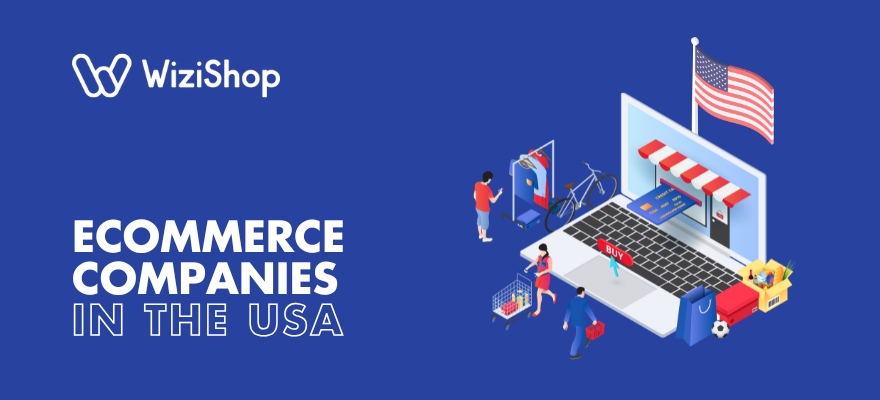The United States is one of the world’s top countries buying online, with millions of consumers turning to digital platforms for everything from groceries and gadgets to fashion and furniture. As ecommerce in the USA continues to thrive, several companies have emerged as industry leaders, setting global standards for innovation, convenience, and customer experience.
In this article, we’ll explore the top ecommerce companies in the USA, highlighting what makes them successful and how they continue to shape the future of online retail. Whether you’re an aspiring entrepreneur or an experienced e-tailer, these brands offer valuable lessons in digital excellence!
1. Amazon

Amazon was launched by Jeff Bezos in 1994 as an online bookstore. It experienced fast growth, now selling a wide range of products, using technology and logistics to streamline shopping. Its focus on customer service, innovation (like Prime and Alexa), and fast delivery helped it become not just a major ecommerce name in the US but also the largest online retailer in the world, according to ecommerce statistics.
Headquarters: Seattle, Washington
Product categories: Books, electronics, automotive, clothing, beauty and personal care, home and kitchen, pet supplies, movies and television, tools and home improvement, software, sports and outdoors, video games, and more
Statistics
- In Q4 2024, Amazon recorded net sales of $187.8 billion, representing an increase of about 10% compared to Q4 2023.
- The ecommerce giant employed 1,556,000 people in 2024.
- As of June 2024, the United States was the country with the greatest number of Amazon visitors at 3.3 billion, accounting for approximately 47.5% of the company’s total visits around the world.
Key features
- Prime membership: Amazon offers fast, free shipping, streaming services, and exclusive deals.
- One-click ordering: Shoppers enjoy simplified purchasing with a single tap.
- Personalized recommendations: The website uses AI to suggest products based on browsing and buying history.
- Customer reviews: Trusted reviews help shoppers make informed decisions.
- Fulfillment by Amazon (FBA): This service enables sellers to store products in Amazon warehouses for fast delivery.
- Excellent customer service: Customers can avail of 24/7 support, easy returns, and a customer-first approach.
- Amazon Web Services (AWS): A global leader in cloud computing, this service powers countless businesses, further bolstering Amazon’s profits.
2. eBay

Founded in 1995 by Pierre Omidyar, eBay began as an online auction site called AuctionWeb. It grew rapidly, connecting buyers and sellers worldwide. Known for its auction-style listings and marketplace model, eBay remains one of the top ecommerce sites in the USA and beyond by enabling individuals and businesses to easily buy and sell goods online.
Headquarters: San Jose, California
Product categories: Books, music, movies, toys, home and garden, sporting goods, pet supplies, electronics, clothing, shoes, accessories, health and beauty, and more
Statistics
- As of Q4 2024, eBay had 134 million active buyers.
- The eBay mobile app recorded 9.4 million downloads from U.S. users in 2023, making the United States the app’s biggest market.
- In April 2023, eBay came in 2nd place in terms of global online marketplaces with the most monthly traffic, averaging around 1.2 billion visits.
Key features
- Auction-style listings: Buyers can bid on items, often scoring deals and rare finds.
- Buy It Now option: This feature allows shoppers to purchase items instantly at a fixed price.
- Global marketplace: eBay connects millions of buyers and sellers across the world.
- Seller tools and feedback system: The website empowers sellers with performance insights and builds trust through ratings.
- Diverse product range: Shoppers can find everything from collectibles and used goods to brand-new items.
3. Apple

Tech titan Apple was created in 1976 by Steve Jobs, Steve Wozniak, and Ronald Wayne. Known for revolutionary products like the iPhone, Mac, and iPad, Apple built a loyal customer base. Its sleek online store, ecosystem integration, and premium brand have made it one of the most popular companies, both for ecommerce and traditional commerce, in tech and electronics.
Headquarters: Cupertino, California
Product categories: Computers, phones, tablets, wearable devices, and more
Statistics
- In fiscal year 2024, Apple reported total revenue of approximately $391 billion, a slight decrease from fiscal year 2022’s $394.33 billion.
- Apple shipped 225.9 million iPhones globally in 2024, a 1% year-over-year decline.
- As of March 2025, Apple holds a 27.68% share of the global mobile vendor market, leading over competitors like Samsung.
Key features
- Seamless ecosystem: Apple devices work together smoothly, encouraging repeat purchases and customer loyalty.
- Premium online store: Its official website and Apple Store app offer a sleek, user-friendly shopping experience.
- Product customization: Buyers can personalize devices with options like storage, colors, and engravings.
- Apple Trade In: Customers can exchange old devices for credit, making upgrades more affordable.
- Top-tier customer support: AppleCare and Genius Bar services provide expert help and warranty coverage.
4. Walmart

Walmart was founded by Sam Walton in 1962 with the opening of its first store in Rogers, Arkansas. By focusing on low prices and customer satisfaction, it rapidly expanded, becoming the largest U.S. retailer by 1990. In recent years, Walmart has significantly grown its ecommerce operations and stands as one of the top Amazon competitors, taking advantage of its extensive network of physical stores as distribution hubs, enabling rapid delivery services.
Headquarters: Bentonville, Arkansas
Product categories: Tech and electronics, toys and outdoor play, grocery, pets, beauty, personal care, baby and kids, home, garden, tools, clothing, shoes, accessories, and more
Statistics
- Walmart’s U.S. ecommerce sales reached $65.4 billion in fiscal year 2024, marking a 22% increase from the previous year.
- In 2024, ecommerce accounted for 17.8% of Walmart’s total sales, a significant rise from 4.8% in 2018.
- In Q2 2024, Walmart captured a 37% share of the U.S. online grocery market, reflecting its dominance in this sector.
Key features
- Store-to-door integration: Walmart leverages its vast network of physical stores as fulfillment centers for fast, efficient online order delivery.
- Walmart+ membership: This service competes with Amazon Prime by offering free shipping, fuel discounts, and grocery perks.
- Strong online grocery services: The retail company dominates the online grocery space with curbside pickup and same-day delivery.
- Everyday low prices: Walmart maintains competitive pricing both in-store and online, attracting budget-conscious shoppers.
- Third-party marketplace: A growing number of third-party sellers can be found here, expanding product variety for online customers.
5. Etsy

Etsy, launched in 2005, is a U.S.-based online marketplace specializing in handmade, vintage items, and craft supplies. Its focus on unique, artisan goods has attracted a dedicated customer base.
Headquarters: Brooklyn, New York
Product categories: Bath and beauty, art and collectibles, clothing, gifts, jewelry, home, accessories, and more
Statistics
- Etsy generated revenue of around $2.8 billion in 2024, a 2.18% increase from the approximately $2.7 billion earned in 2023.
- By the end of 2024, Etsy had 89.6 million active buyers.
- The number of active sellers on Etsy was 5.6 million in 2024, down 20% from 7 million in 2023.
Key features
- Handmade and unique products: Etsy specializes in custom, handmade, and vintage goods that aren't typically found on mainstream retail sites.
- Support for independent sellers: The platform empowers small business owners, artisans, and creators to reach a global audience.
- Personalization options: Many listings offer personalized touches, making gifts and items more meaningful to buyers.
- Strong community and branding: Etsy fosters a creative, community-driven environment with a distinct, artistic brand identity.
- Niche market focus: The marketplace dominates the craft, DIY, and vintage markets, carving out a loyal customer base looking for one-of-a-kind items.
6. Kroger

Beginning as the Great Western Tea Company in 1883, Kroger was founded by Bernard Kroger in Cincinnati, Ohio. It pioneered innovations like in-store bakeries and meat departments, evolving into one of the largest U.S. supermarket chains. In recent years, Kroger has prioritized web commerce, establishing a dedicated ecommerce unit in 2025 to enhance its digital presence.
Headquarters: Cincinnati, Ohio
Product categories: Grocery, health, beauty, home, electronics, toys, pet supplies, and more
Statistics
- Digital sales made up approximately 8.8% of Kroger’s total company sales of $147.1 billion in fiscal year 2024.
- In the fourth quarter of fiscal year 2024, Kroger’s digital sales increased by 11% year over year, contributing to more than $13 billion in annual internet commerce sales.
- As of 2024, Kroger holds a 9.9% share of the U.S. online grocery market, positioning it as a significant player in the sector.
Key features
- Robust online grocery services: Kroger offers convenient options like curbside pickup and same-day delivery through its app and website.
- Personalized digital coupons: Shoppers receive tailored discounts based on their purchase history, enhancing customer loyalty and savings.
- Seamless in-store and online integration: Digital tools like Kroger Pay and in-app shopping lists bridge the online and in-store experience.
- Ocado-powered fulfillment centers: Automated warehouses enable fast, efficient order fulfillment and delivery.
- Data-driven personalization: Through its 84.51° analytics arm, Kroger uses customer data to personalize offers and improve the shopping journey.
7. Target

Target Corporation, started by George Dayton in 1902 as Goodfellow Dry Goods, opened its first Target store in 1962 in Roseville, Minnesota, introducing a discount retail model. Over the years, Target has expanded nationwide, operating nearly 2,000 stores across the U.S. Target has significantly enhanced its ecommerce presence by integrating digital and physical shopping experiences, investing in same-day delivery services.
Headquarters: Minneapolis, Minnesota
Product categories: Clothing, shoes, accessories, grocery, furniture, kitchen and dining, electronics, toys, sports and outdoors, beauty, movies, music, books, and more
Statistics
- In Q4 2024, Target’s digital comparable sales increased by 8.7%.
- Digital sales accounted for 22.8% of Target’s total sales in Q4 2024, up from 21.3% in Q4 2023. For the full year, digital sales represented 19.6% of total sales, an increase from 18.3% in 2023.
- Target’s same-day delivery service, powered by Target Circle 360, experienced growth of more than 25% in Q4 2024 compared to the previous year.
Key features
- Same-day fulfillment options: Same-day services like Order Pickup, Drive Up, and Shipt delivery make online shopping ultra-convenient and fast for customers.
- Seamless omnichannel experience: With tight integration between its physical stores and online platform, Target allows consumers to shop and return items effortlessly across channels.
- Target Circle loyalty program: The program provides personalized deals, rewards, and exclusive offers, encouraging repeat purchases and customer engagement online.
- Strong private label brands: Target’s exclusive brands like Good & Gather, Cat & Jack, and Threshold draw online shoppers with high-quality, affordable options only available through Target.
- Intuitive mobile app and website: The company’s app and website are known for their clean design, personalized recommendations, and features like mobile wallet and real-time inventory tracking, enhancing the digital shopping experience.
8. Home Depot
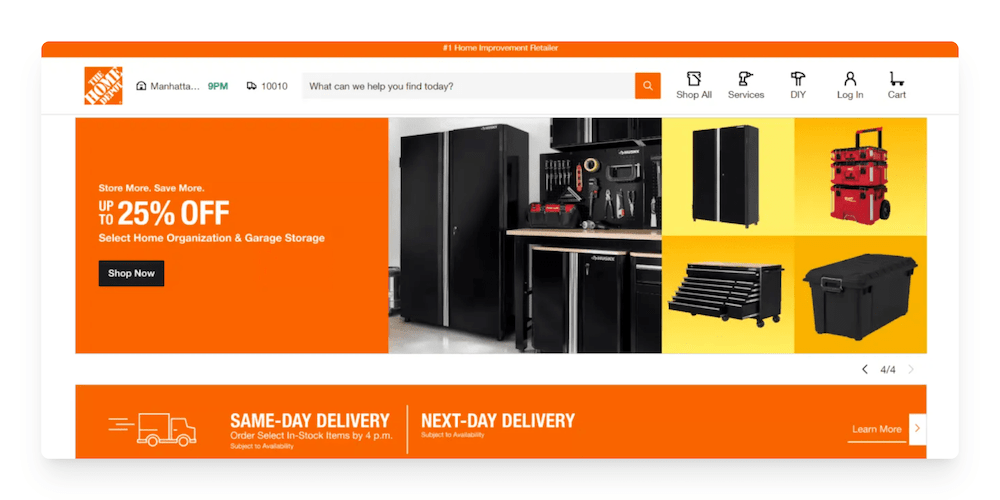
Home Depot, founded in 1978, is the largest home improvement retailer in the United States., offering tools, construction products, appliances, and services. Its robust online presence, extensive product range, and seamless in-store pickup options have made it a major ecommerce player, serving both DIY customers and professional contractors nationwide.
Headquarters: Atlanta, Georgia
Product categories: Appliances, tools, building materials, home decor, outdoor living, kitchen and bath, electrical and lighting, plumbing, flooring, and more
Statistics
- In February 2025, Home Depot’s website drew over 181 million visits.
- In Q4 of fiscal year 2024, Home Depot’s online sales increased by approximately 9% compared to the same period the previous year.
- In 2023, ecommerce accounted for about 14.8% of Home Depot’s total net sales.
Key features
- Extensive online inventory: Home Depot offers a vast online catalog of over two million products, covering everything from tools to home décor, ensuring customers can find nearly anything they need for home improvement.
- Buy online, pick up in store (BOPIS): People can conveniently shop online and pick up their orders the same day at their nearest store, blending speed with flexibility.
- Pro Xtra loyalty program: Tailored for professionals, this program offers exclusive deals, volume pricing, and personalized tools that drive repeat business through the online platform.
- Project-based shopping experience: Home Depot’s website and app support project-based browsing, helping customers find all necessary items for renovations or DIY tasks in one seamless digital experience.
- Efficient delivery services: With options like scheduled delivery, curbside pickup, and direct-to-job-site shipping, Home Depot ensures ecommerce orders are fulfilled quickly and reliably.
9. Best Buy
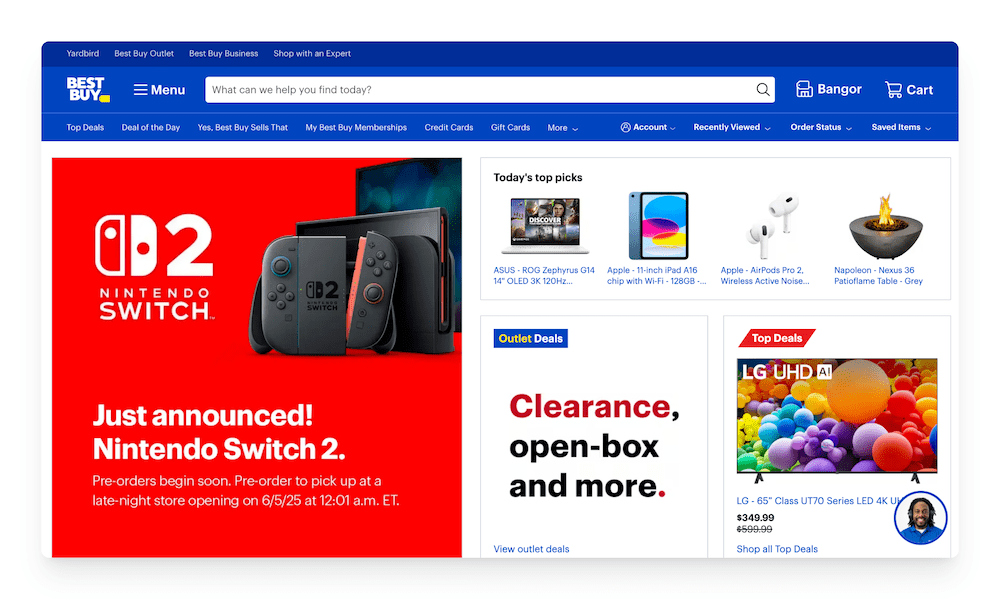
Created in 1966, Best Buy is one of the best-known U.S. consumer electronics retail companies, known for its wide range of tech products and services. Its strong ecommerce platform, fast delivery options, and expert support have helped it become a top online destination for electronics and home appliances in the digital age.
Headquarters: Richfield, Minnesota
Product categories: Appliances, TV and home theater, computers and tablets, cell phones, audio, cameras, video games, and more
Statistics
- In Q4 of fiscal year 2025, Best Buy’s domestic online revenue increased by 2.6% on a comparable basis, reaching approximately $5 billion.
- During the same quarter, online sales made up 39.5% of Best Buy’s total domestic revenue, up from 38.0% in the previous year.
- During Q4 of fiscal year 2025, around 45% of Best Buy’s online revenue was fulfilled through in-store pickup, indicating the effectiveness of its omnichannel strategy in integrating online and physical retail experiences.
Key features
- Strong omnichannel strategy: Best Buy seamlessly integrates online and in-store experiences, offering services like buy online, pick up in store and curbside pickup, making shopping flexible and convenient.
- Expert tech support via Geek Squad: Its in-house Geek Squad provides installation, repair, and support services, enhancing customer confidence in making online tech purchases.
- Wide selection of consumer electronics: Best Buy’s ecommerce platform offers an extensive range of electronics, appliances, and accessories, catering to both everyday consumers and tech enthusiasts.
- Price match guarantee: Customers can shop online knowing they’re getting competitive pricing, thanks to Best Buy’s commitment to matching lower prices from top retailers.
- Personalized deals and membership perks: With programs like My Best Buy memberships, online shoppers receive exclusive discounts, free shipping, and early access to sales, boosting loyalty and repeat purchases.
10. Wayfair
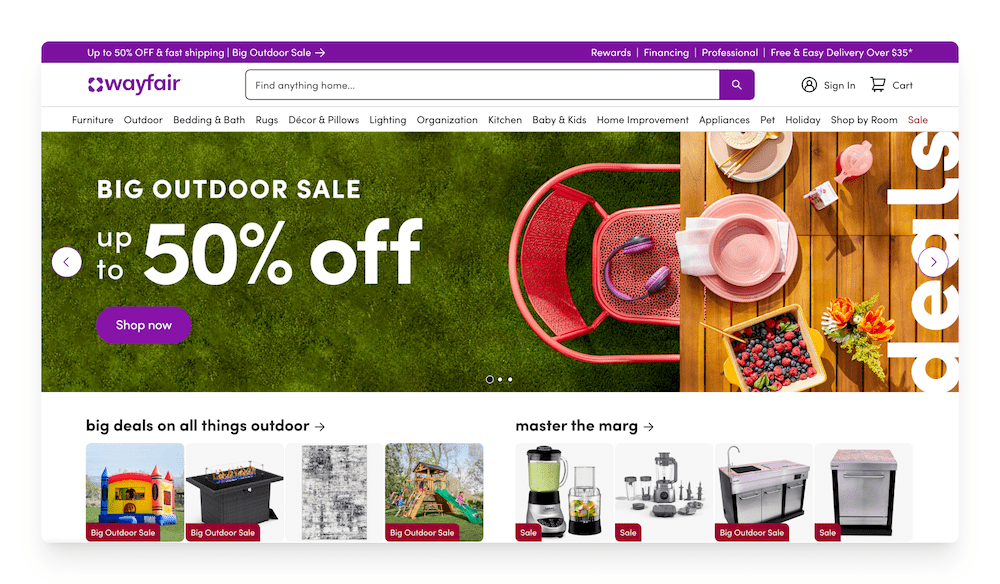
Launched in 2002, Wayfair is a leading U.S. ecommerce company specializing in furniture and home goods. Known for its vast online selection and competitive pricing, Wayfair has transformed how people shop for home essentials, becoming a top destination for stylish, affordable décor and furnishings delivered directly to customers’ doors.
Headquarters: Boston, Massachusetts
Product categories: Furniture, outdoor, bedding and bath, lighting, kitchen, rugs, home improvement, appliances, pets, and more
Statistics
- Wayfair’s U.S. net revenue increased by 1.1% during Q4 2024, rising by $30 million to reach $2.7 billion.
- As of December 31, 2024, Wayfair had 21.4 million active customers, representing a 4.5% decrease year over year.
- In Q4 2024, 64.5% of total orders delivered were placed via mobile devices, up from 62.8% in the same quarter of 2023.
Key features
- Large product catalog: Wayfair offers over 30 million items across furniture, home décor, and more, giving customers unparalleled variety in one online destination.
- User-friendly online experience: The platform provides intuitive search filters, customer reviews, and 3D room planning tools to simplify and personalize the home shopping process.
- Competitive pricing and deals: Wayfair frequently offers discounts, flash sales, and free shipping on many items, making stylish home goods accessible at affordable prices.
- Strong private label brands: Wayfair has developed exclusive in-house brands like Birch Lane and AllModern, allowing it to offer unique styles and control quality and pricing.
- Efficient nationwide logistics network: With its proprietary logistics and delivery system, including Wayfair Delivery Network (WDN), the company ensures fast, reliable shipping across the United States.
11. Costco

Membership-based warehouse club Costco was started in 1983 and is known for offering bulk products at competitive prices. With a strong reputation for value and quality, Costco has expanded its digital presence, becoming a top ecommerce player by integrating online ordering, delivery services, and exclusive member benefits into its retail model.
Headquarters: Issaquah, Washington
Product categories: Grocery and household, optical, pharmacy, and various services
Statistics
- Costco’s ecommerce sales experienced 18.9% year-over-year growth in Q4 of fiscal year 2024, significantly outpacing the company’s total comparable sales growth of 5.4% during the same period.
- For the entire fiscal year 2024, Costco’s ecommerce sales grew by 16.1% compared to the previous year, demonstrating a robust expansion in the company’s online retail segment.
- Throughout fiscal year 2024, Costco Logistics delivered more than 4.5 million items, marking a 29% increase from the prior year.
Key features
- Member-only access and pricing: Costco’s ecommerce platform is exclusive to members, offering significant savings and bulk deals that encourage loyalty and repeat online purchases.
- Wide range of high-quality products: From electronics and appliances to groceries and furniture, Costco.com offers a curated selection of top-tier products at competitive prices.
- Efficient logistics and delivery services: With the growth of Costco Logistics, the company provides reliable home delivery for large items, enhancing its ecommerce fulfillment capabilities.
- Exclusive online-only deals: Costco regularly features products and savings available only through its website, driving more customers to shop online.
- Integrated services and support: Costco’s online platform includes access to additional services like optical, pharmacy, and travel, making it a one-stop shop for members’ diverse needs.
12. Chewy
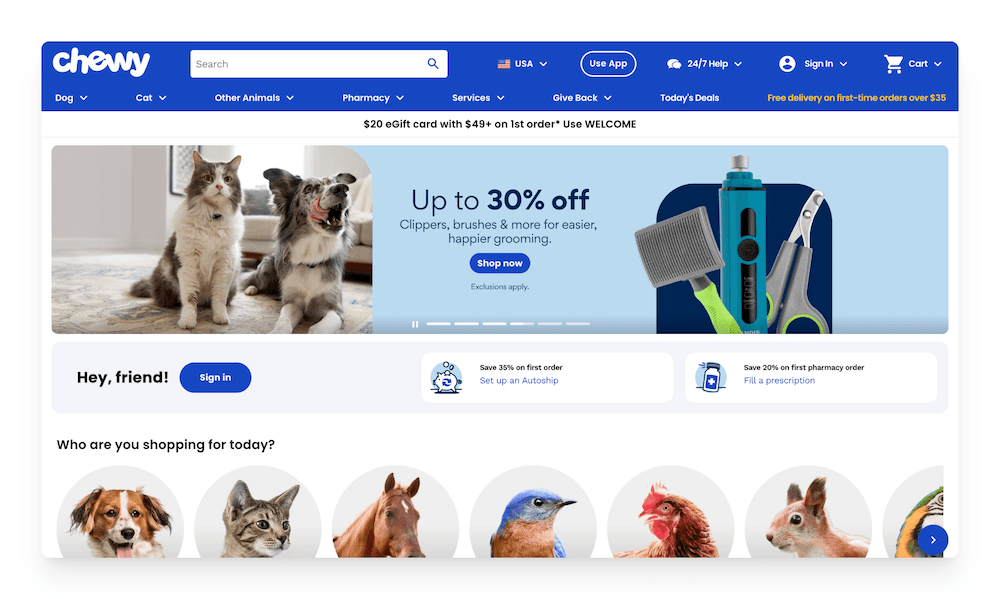
Chewy, founded in 2011 by Ryan Cohen and Michael Day, is a popular U.S. online retailer specializing in pet food and supplies. Renowned for its extensive product selection and exceptional customer service, Chewy has become a top ecommerce destination for pet owners all across the US.
Headquarters: Boston, Massachusetts
Product categories: Pet supplies, pharmacy, and vet services
Statistics
- Chewy reported net sales of $3.25 billion for Q4 of fiscal year 2024, a 14.9% increase compared to the same period the previous year.
- As of the end of fiscal year 2024, Chewy had 20.5 million active customers.
- In Q4 of fiscal year 2024, Autoship customer sales increased by 21.2% year over year to $2.62 billion, accounting for 80.6% of Chewy’s total net sales during the quarter.
Key features
- Extensive product selection: Chewy offers a vast array of over 115,000 pet products, including food, toys, medications, and accessories, catering to a wide range of pet needs.
- Autoship subscription service: The Autoship program allows customers to schedule recurring deliveries of pet essentials, providing convenience and ensuring pets never run out of necessities.
- Exceptional customer service: Chewy is renowned for its 24/7 customer support, offering personalized assistance and proactive engagement, such as sending handwritten notes and surprise gifts to customers.
- Integrated veterinary services: Through services like “Connect With a Vet,” Chewy provides pet owners with access to licensed veterinarians for consultations, enhancing the overall pet care experience.
- User-friendly mobile app: Chewy’s mobile application offers a seamless shopping experience with features like order tracking, personalized recommendations, and easy reordering, catering to the on-the-go needs of pet owners.
Conclusion
The top ecommerce companies in the USA have redefined how consumers shop by focusing on convenience, innovation, and customer experience. These industry leaders offer valuable insights for anyone looking to succeed in the digital marketplace.
If you’re inspired to launch your own ecommerce business, a solution like WiziShop can make it easier than ever. With its all-in-one platform, powerful artificial intelligence, SEO support, and user-friendly interface, WiziShop empowers entrepreneurs to build, manage, and grow a professional online store—no coding required!
Start your journey today and turn your ecommerce vision into reality with WiziShop!
Try WiziShop free for 7 days
THE EASIEST NO-CODE ECOMMERCE SOLUTION✅ No credit card required
✅ Access to all features
✅ No commitment


